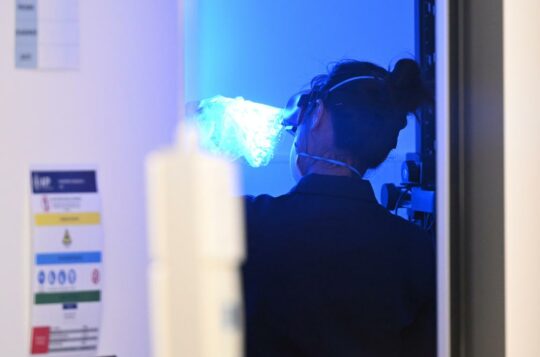
Urgent changes needed to support women in STEM jobs
A new report recommends changes to support more diversity in science, engineering and technology jobs, as the industry fails to embrace change.

A new report recommends changes to support more diversity in science, engineering and technology jobs, as the industry fails to embrace change.
A tiny Australian seed could provide big opportunities for indigenous communities according to new research.
Scientists are surveying remote areas of Antarctica with drones, hoping to protect plants and animals in the fragile ecosystems in the face of climate change.

The firm behind Facebook has bold ambitions for artificial intelligence, with Mark Zuckerberg announcing plans to create the world's most popular AI services.
Researchers have worked out that spider webs are gold mines of information when it comes to the difficult job of understanding where animals live.
The first human patient has received an implant from Elon Musk's Neuralink company, the billionaire CEO has announced.
 business (general)
computing and information technology
ethics
it/computer sciences
science and technology
software
technology (general)
business (general)
computing and information technology
ethics
it/computer sciences
science and technology
software
technology (general)
The use of artificial intelligence technology is expected to skyrocket in 2024 but experts warn of potential risks and the need for an Australian made version.
 business (general)
computing and information technology
internet
online
safety of citizens
science and technology
security
security measures
technology (general)
business (general)
computing and information technology
internet
online
safety of citizens
science and technology
security
security measures
technology (general)
Australia's top cybersecurity agency has issued guidelines for the use of artificial intelligence technology, warning businesses about privacy and data risks.
Researchers say hazard-reduction burns and logging can make forests up to seven times more flammable and it's time to rethink how they're managed.
Voluntary regulations for AI are on the cards as concerns mount about the emerging technology's impact on jobs, copyright and disinformation.

Generative artificial intelligence can create stunning content but experts warn strict rules are needed to ensure viewers know what's real and what's fake.
The federal government is considering mandatory safeguards for the use of artificial intelligence in high-risk settings.

From cars driven by game controllers to vans you can turn into utes, the Consumer Electronics Show in Las Vegas is giving a preview of an unusual future.
After decades of work, scientists have discovered tropical forests are not as diverse as once thought.
Record heat across the world impacted the global water cycle in 2023, scientists have found, contributing to severe storms, floods, droughts and fires.
 disaster (general)
economy, business and finance
environmental issue
housing and urban planning
politics
science and technology
disaster (general)
economy, business and finance
environmental issue
housing and urban planning
politics
science and technology
As storms, floods and bushfires wreak havoc on Australia, a little-known company owned by the nation's governments is in demand for its digital intelligence.

A push to add nuclear to Australia's energy mix may be silenced by a steep upward revision of the cost of small reactors by the national science agency.
Australians will have their best opportunity in years to watch the annual Geminid meteor shower due to a near-ideal combination of conditions.

Researchers are investigating whether Amazon's Alexa, Apple's Siri or Google Home speakers should be used to detect violence in homes.

Australia's Federal Court has issued Fitbit with an $11 million penalty for making misleading claims to customers who complained about faulty devices.
 computing and information technology
economy (general)
employment
it/computer sciences
job layoffs
science and technology
technology (general)
computing and information technology
economy (general)
employment
it/computer sciences
job layoffs
science and technology
technology (general)
Professions likely to feel the early impact of artificial intelligence have been identified by a report that warns training must adapt to fit the technology.

A business summit has heard Australia should not introduce laws around the use of artificial intelligence or it could risk being left behind other countries.

The climate crisis is being made worse by an information crisis, with some Australian outlets accused of peddling fake news and adding to confusion and delay.
Australia is close to meeting its 2030 emissions reduction targets, but the energy minister won't say how much a clean transition will cost taxpayers.
Queensland's attorney-general has backed the concept of a national standard for forensic testing after years of bungles at a state-run laboratory.
A popular former children's TV host dubbed "Ranger Stacey" is among the Australians who have had new species of spiders named after them in a published study.

A pact on artificial intelligence is intended to protect people from harm without stifling breakthroughs in vaccines, computing and defence.
Faster and more reliable internet speeds are part of a federal government upgrade package for southeast Queensland residents .
Hundreds of millions of dollars will be pumped into wiping out fire ants, the tiny invasive insect which poses a huge risk to Australian agriculture.
King Charles III has given the world's most prestigious engineering prize to a group of Australians whose invention has helped slash solar energy costs.
Australia's eSafety Commissioner says some of the biggest tech companies aren't living up to their responsibilities to tackle child sexual exploitation.